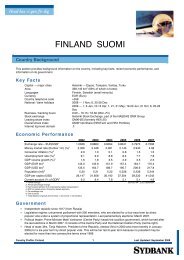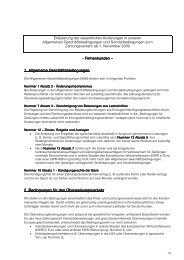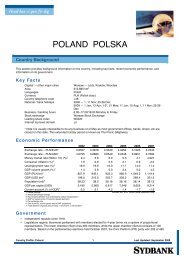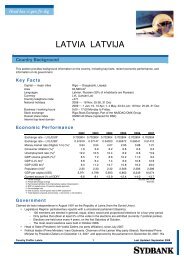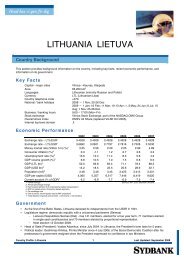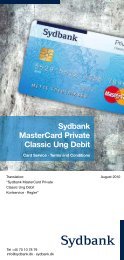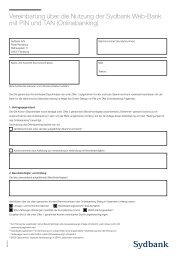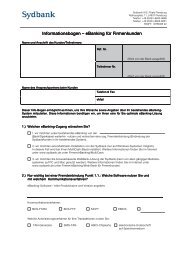SWEDEN SVERIGE - Sydbank
SWEDEN SVERIGE - Sydbank
SWEDEN SVERIGE - Sydbank
You also want an ePaper? Increase the reach of your titles
YUMPU automatically turns print PDFs into web optimized ePapers that Google loves.
Ove rvie w<br />
» Cash is used primarily in transactions involving small values, where the seller and buyer meet directly. Cash<br />
payments still account for a large proportion of the number of transactions in the Swedish economy, although this<br />
proportion has decreased in recent years in favour of the use of cards.<br />
» In value terms, credit transfers gained a stronger position during the 1990s. However, during this period their<br />
percentage of total transactions in volume terms declined. The explanation for this is the six-fold increase in the<br />
number of card transactions, of which credit cards have increased in volume terms by over 400 per cent.<br />
» Banks in Sweden have been implementing SEPA (Single Euro Payments Area) standards for EUR-denominated<br />
payments. The country’s banks now only issue SEPA-compliant debit cards (since 1 January 2008) and offer<br />
pan-European SEPA credit transfers since 28 January 2008. SEPA direct debits however will not be available<br />
until 1 November 2009 at the earliest.<br />
Transaction Volumes, mil. Transaction Values, SEK bn.<br />
2003 2005 2006 % change 2003 2005 2006 % change<br />
Debit cards * 781 892 999 12.0% 295.6 335.3 359.1 7.1%<br />
Credit cards ** 100 111 134 20.7% 36.13 25.74 37.27 44.8%<br />
Credit transfers 462 511 572 11.9% 7,106 7,949 6,868 -13.6%<br />
Direct debits 143 160 197 23.1% 302 344 387 12.5%<br />
Cheques 1 1 1 - 59.4 54.9 54.1 -1.5%<br />
Total 1,542 1,729 1,961 13.42% 7,852.7 8,764.5 9,764.7 11.4%<br />
* Includes payments by cards with a debit and/or delayed debit function.<br />
** Includes payments by cards with a credit and/or delayed debit function.<br />
Card Payme nts<br />
Note: Figures are rounded. Percentage change calculated from 2005-2006<br />
Sources: ECB Statistical Data Warehouse<br />
» Over the past decade the number of card transactions in Sweden has increased by a factor of six. In 2006 card<br />
transactions, in volume terms, accounted for nearly 58% all cash-less transactions in Sweden ⎯ though only a<br />
mere 4% in value terms.<br />
» At year-end 2006 there were 13.89 million issued cards in Sweden. 8.6 million were debit and approx. 3 million<br />
were credit cards, with the remainder having a mix of delayed debit with debit or credit functionality.<br />
» Debit cards have gained the most in importance. Debit cards linked to bank accounts usually combine several<br />
functions, namely those of a debit card for EFTPOS and paper-based transactions; those of an ATM card for<br />
cash withdrawals; and those of a credit card to the extent that the bank account to which the card is linked has an<br />
overdraft facility. In addition, these cards are usually provided with a link to international card systems such as<br />
Visa or MasterCard, which also makes them useful for international travel.<br />
» 2,807 ATMs and 182,590 point of sales terminals are available around the country.<br />
» The following is an executive summary of the development of financial cards in Sweden by Euromonitor as of<br />
March 2008:<br />
» General increase in the usage of financial cards<br />
– In 2007, the numbers of cards, transaction value and volume have continued to increase in Sweden.<br />
– The use of cash is decreasing, while the point-of-sale infrastructure is continuing to develop, facilitating<br />
increased card usage.<br />
– The number of ATM transactions is expected to decrease in the future in favour of financial cards.<br />
– All types of financial cards showed an increase in both value and volume over the last few years.<br />
» Fees for smaller payments are slowing down the growth of financial cards<br />
– While larger shops have adopted the point-of-sale infrastructure allowing the customers to pay freely with<br />
financial cards, small shops and kiosks usually do not favour small payments, typically under SEK100,<br />
with financial cards. This is due to the cost for the outlet associated with the financial card transaction.<br />
– Despite the fact that outlets have agreements with the acquirers not to make a charge for a payment with<br />
financial card, it became customary for small outlets to do so in Sweden.<br />
» Increasing competition in credit cards<br />
– The credit cards landscape is likely to be reshaped in the future.<br />
– The big four Swedish banks started competing with each other more intensely some three years ago.<br />
Country Profile: Sweden 8 Last Updated: September 2008



